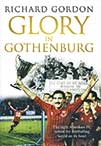 by Richard Gordon
by Richard Gordon
Black and White, £7.99
Reviewed by Dianne Millen
From WSC 316 June 2013
Even now, 30 years on, if you mention the date May 11, 1983 to any Aberdonian, even the coldest north-eastern eyes will mist over as we mutter affectionately “Aye, Gothenburg”. For it was on that night that Aberdeen, led by Alex Ferguson, beat Real Madrid 2-1 to lift the Cup-Winners Cup. BBC journalist and lifelong Dons fan Richard Gordon has now commemorated the 30th anniversary of the club’s most famous triumph in this engaging account.
Structured around the journey to the final – and beyond it to the subsequent Super Cup victory over SV Hamburg – the chapters assess each game and the impressive domestic results which surrounded it, presenting a pen portrait of a single member of the legendary team. These interviews are often both hilarious and insightful and convey a sense of how those individuals operated, and how they managed to achieve what they did. Even if, as Eric Black recalls, it was considered no big deal: “I just thought that was how it was – you turned up, played a game, got shouted at a bit and won a trophy every year!” (Aside from the European triumph, Ferguson’s Aberdeen were Scottish champions three times and won five domestic cups.)
That collective energy, Ferguson’s ability to construct a team greater than the sum of its parts, lifted the Dons to the highest levels. Ferguson’s attention to detail and control-freak tendencies irked some players but, as Gordon Strachan puts it: “At Pittodrie every Monday morning there would be eight of us wanting to kill Fergie but by Tuesday we’re laughing and joking about it.”
The author lets the overall picture gradually emerge as we read each individual’s account. The result is a fascinating tale of how a group of talented, but otherwise fairly ordinary, blokes did something exceptional together. While there is plenty of information and several mini match reports in the book, Gordon’s pacey writing style ensures it doesn’t get bogged down with the kind of details only a hardcore fan would want to know. Perhaps the only disappointment is that while he touches on the factors which made the team’s success possible, without an interview with Ferguson himself (although his shadow falls on almost every page) the analysis is inevitably incomplete.
Celebrating Gothenburg has sometimes been seen as controversial. Certain commentators (and even some managers) accuse Aberdeen fans of living in the past – or use it as a stick with which to beat those of us who call for better than mid-table finishes, even in these changed days. Ultimately, however, this book reminds us of just how amazing the achievement was and that it is still worth celebrating. And that given the right set of people and circumstances, any of us can achieve more than we thought we could.